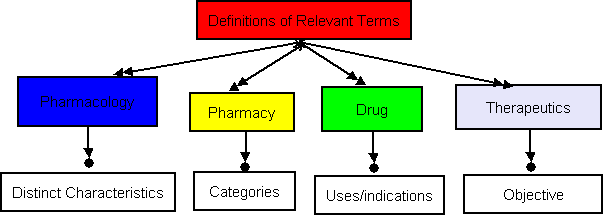Lesson 1: Introduction to Core Concepts of Pharmacology
Contents
INTRODUCTION
Pharmacology is the study of medicines and is a discipline devoted to patient therapy through the use of drugs. In other words it is a discipline devoted to patient therapy by the use of drugs. In this lesson we will go through the basic concept and field of Pharmacology and Pharmacy. There are some related terms including drugs and therapeutics which are fields closely connected to Pharmacology. Understanding these terms makes it clearer for us to understand this field of treatment, prevention and diagnosis of disease
| The objective of this coarse is to facilitate to stakeholders how to improve quality of work on distant learning mode online. |
LESSON CONTENT
It is always essential to understand the meaning of a subject matter of interest to in order to appreciate that particular field of study. The most convenient and fundamental thing to do is define the core concepts. In line with this we define the following as;
Pharmacology
The science or study of drugs: their origin, preparations, properties, uses, actions and effects. As such it includes indications, contra-indications, selective activity (activity whereby a drug acts on a particular part of the body at a time for treatment)A school of thought refers to Pharmacology as the study of how drugs modify biochemical, physiological and psychological processes in health and disease. The study enables us study the interaction of living cells and organisms with the drug molecules they encounter when we take in drugs. In a nut shell, Pharmacology involves the study and description of the actions of drugs and chemicals on cells, tissues and the whole body. It includes researching how drugs produce beneficial and adverse effects, and improving the way drugs are tested to give greater benefit in the treatment of disease.
Pharmacy
- This is the art and/or science of preparing and dispensing drugs used for the prevention, diagnosis and treatment of diseases.
- It is also a shop/place for selling or compounding and dispensing drugs
- Pharmacy is also seen as a profession
More recently pharmacy has expanded to include medication review and drug information.
Drug
A chemical substance, which has a selective activity or value in the treatment of a disease or can affect living things/processes. In other words they are, biologically active compounds given to humans or animals with the intention of changing the state of body functioning: to relieve pain, treat conditions, eliminate infection or improve health in any way or to investigate the functions of the body.
Therapeutics
Application of drugs in the prevention, diagnosis and treatment of a disease(s) or to alter a normal body function (e.g. oral contraceptive) The area is at the core of the nursing profession especially for maintaining health and sometimes longetivity. The main objective of therapeutics is to provide maximum benefit of the drug and minimum harm to the organism.
| We can see that pharmacology involves the study of the effects of chemicals substances known as drugs on living organisms. Though the definition of pharmacology and therapeutics may bear close relation to each other, they have distinct characters that set them apart. We can conclude that drugs are essential in the nursing profession because the nurse must understand what biologically active chemical compounds do in the body, and how the body reacts to them. |
Aakwaamensah 15:34, 26 February 2007 (CET)

